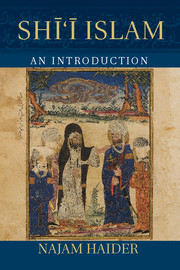Book contents
- Frontmatter
- Dedication
- Contents
- List of Tables and Maps
- Acknowledgments
- Note on the Cover Image
- A Note on Transliteration and Dating
- Maps
- Introduction
- Section 1 Theology
- Section 2 Origins
- Section 3 Constructing Shī‘ism
- Section 4 Shī‘ism in the Modern World
- Appendix Verses Mentioned in the Argument from Qur’ānic Expectations in Chapter 3
- Index
Section 3 - Constructing Shī‘ism
Published online by Cambridge University Press: 05 August 2014
- Frontmatter
- Dedication
- Contents
- List of Tables and Maps
- Acknowledgments
- Note on the Cover Image
- A Note on Transliteration and Dating
- Maps
- Introduction
- Section 1 Theology
- Section 2 Origins
- Section 3 Constructing Shī‘ism
- Section 4 Shī‘ism in the Modern World
- Appendix Verses Mentioned in the Argument from Qur’ānic Expectations in Chapter 3
- Index
Summary
Constructing Shī‘ism
Religious traditions evolve to fit the changing needs and circumstances of their adherents. If a community shifts from a position of political power to one of subordination, this change may be reflected in a reformulation of religious beliefs. These new beliefs are not presented as innovations but rather are framed as the natural extensions of established beliefs. In this manner, religious traditions are perpetually in flux, with particularly traumatic moments generating fundamental doctrinal reorientations.
Sections 1 and 2 of this book articulated the basic theological principles that underlie Shī‘ism as a whole and identified those historical episodes that united and divided Shī‘ī groups. Section 1 discussed the Shī‘ī belief in rationally comprehensible divine justice (‘adl) and its connection to legitimate leadership (imāma). Although all Shī‘ī groups agreed on the broad parameters of ‘adl, they disagreed regarding the scope of the Imām’s authority. Section 2 examined the ways in which theology affected a community’s remembrance of its past. Key concepts such as designation (nass) or infallibility (‘isma) were written into historical narratives to tie later theological developments to perceptions of a group’s origins.
- Type
- Chapter
- Information
- Shi'i IslamAn Introduction, pp. 101 - 102Publisher: Cambridge University PressPrint publication year: 2014



